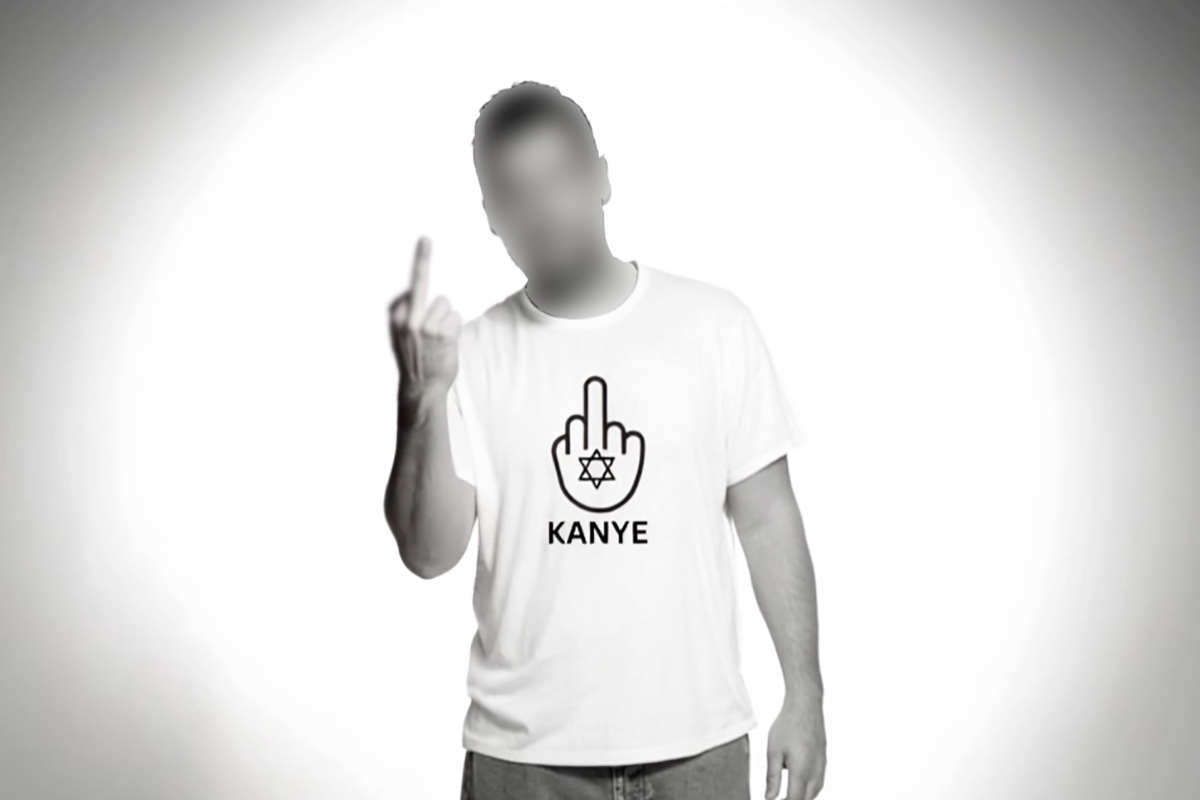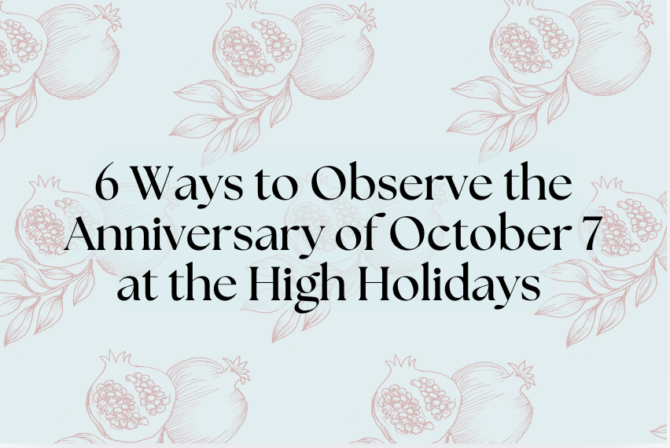I’m sure you’ve seen it: the now-viral AI-generated video of deepfake depictions of Jewish celebrities wearing t-shirts saying “F*ck Kanye” with a middle finger raised.
“A video released on social media on Tuesday shows a wide array of Jewish celebrities, including Steven Spielberg and Woody Allen, wearing a T-shirt with a raised middle finger and the word “Kanye” — a rejection of the rapper Kanye West’s antisemitism.
The video resembles any number of PSAs created by Jewish advocates, with one catch: None of the celebrities consented to participating.
That’s because the video was made with generative AI, an emerging technology that instantly creates lifelike animation, opening new frontiers for creativity while also raising ethical questions about what can be rendered and how such products should be labeled.
Released on Instagram by Ori Bejerano, an Israeli generative AI entrepreneur, the video spread rapidly on Tuesday, riding a wave of anger at West and frustration over his persistence as a presence in the public sphere despite a years-long record of antisemitism. Over the last week, West posted a string of antisemitic tweets, then paid for a Super Bowl ad directing viewers to a website that sold just one product: a $20 T-shirt with a swastika on it.
I’m here to tell you why sharing this video, whatever its intentions and however delightful you might find it, is highly problematic.
There were many potential ways of doing this that would be less harmful — the video’s creators chose not to use them. Let’s say this video had clear captions within it that purposely identified it as AI and not “real.” Let’s say that this video made it explicitly clear, in said clear captions or spoken text, that it was meant to call out and shame heretofore silent Jewish celebrities to do better in standing up against antisemitism. Let’s say that this video was purposely created in a way to be more obviously fake — say, by making everyone’s skin tone purple, or having everyone have horns in an homage to that age-old antisemitic trope. We would probably still be having a discussion, but a very different one than we are now.
The virality of the video, sadly, is not due to its sharp intellectual commentary on the age in which we live, but to its reliance on its AI ability to insidiously deceive the viewer’s own eyes.
Most of the people sharing the video on my Instagram and Facebook feeds seemed unaware that it was AI-generated. Their shares were based on an untrue assumption that deliberately weaponized the ignorance of the viewer and the viewer’s inability to tell fact from fiction.
There’s a subset of those shares, of course, of people who say they knew it was AI (maybe Michael Bloomberg’s sinewy muscle-bound forearms gave it away?), but they wanted to share it because they “loved” it. Which part, I wonder, do these people love? The false idea that all of these celebrities, in an imaginary, designed-by-computer world, would profess their anger at Kanye (when in the actual reality in which we all reside, many of them haven’t said a word about antisemitism)? I see the appeal of that, I guess, but the fact that there is no actual (semi-cringey?) video of celebrities actively denouncing antisemitism seems sadder to me, and the contrast brings that sadness into higher relief than my fleeting “yay” feeling of seeing a fake one.
Do they love the idea that people’s images, movements and public personae can be stolen from them, misappropriated and used to do the bidding of whoever was dextrous enough with AI? Because on that, actress Scarlett Johansson (who is “in” the viral video) has already spoken up. In a statement to People Magazine, Johansson denounced “the misuse of A.I., no matter what its messaging.”
“It has been brought to my attention by family members and friends, that an A.I.-generated video featuring my likeness, in response to an antisemitic view, has been circulating online and gaining traction,” Johanssen wrote. “I am a Jewish woman who has no tolerance for antisemitism or hate speech of any kind. But I also firmly believe that the potential for hate speech multiplied by A.I. is a far greater threat than any one person who takes accountability for it. We must call out the misuse of A.I., no matter its messaging, or we risk losing a hold on reality. I have unfortunately been a very public victim of A.I.,but the truth is that the threat of A.I. affects each and every one of us.”
Yet another thing that Scarlett and I have in common (strong Jewish women, Marvel superheroes, against AI misappropriations — I mean, we are practically twins!). This leads me to my second point: We should not share and therefore actively encourage deepfakes, misinformation or disinformation, even when we agree with what a given instance of AI happens to be expressing ideologically.
I reached out to one of the creators of the AI video, Israeli entrepreneur Ori Bejerano. He wrote back to me. I told him that I felt uncomfortable with his decision to make the video and wanted to hear his take on it and what impelled him to do it despite what, to me, were clear issues with doing so.
He didn’t respond after that.
But fortunately, he doesn’t need to! Because hey, I know what I think he should say, and what would support my position, and what would sound good in an article, so I’m going to make it up and present it as though he said the things I wanted him to say!
Do you see the problem?
For those who need to have it spelled out explicitly, I’M KIDDING and would never do that. But videos like this — videos deliberately made to look real that are deep fakes — open the door to the active devaluation of truth. And that is not going to end well for any of us.
Videos like this devalue reality. They also devalue artists. They even devalue the actual times when someone speaks up against antisemitism. Jewish advocacy in particular, I’d argue, should be careful not to play cards we would deplore others using.
Here’s where I put on my Jewish journalist and advocacy hat and say that I find this particularly problematic in this sphere. We are trying to win allies in our fight against antisemitism, are we not? So is the way to do that by actively lying, misappropriating celebrity images and contending they take a position that many of them, sadly, have not?
I do not think that we, as Jewish advocates, should use methods that we would actively deplore if anyone else used them to advance ideas that would be odious to us. Let’s say Kanye made an AI video of tons of non-Jewish celebrities wearing t-shirts that say, “F*ck Jews,” or, hypothetically, the very t-shirt he was selling on his now-defunct website. Would that bother you? What if someone made an AI video of released Israeli hostages walking through Tel Aviv’s Hostage Square as liberated people, wearing t-shirts that said, “I Love Hamas” or “From The River To The Sea?” Would you find that problematic?
Let’s make it more personal. Do you want your image being manipulated and used to profess the exact opposite of where you stand politically? Do you want someone making a video of you speaking and saying something maybe you mostly do agree with, but you didn’t actually say it, and sending it to everyone you ever knew? Do you want this happening to your children?
The common denominator here — the deliberate manipulation of reality and of viewer perception — is inherently problematic. We are playing with fire. We will get burned. Don’t play into this.
We need to remember that what we share — and what we choose not to share — matters.
In this algorithmically-governed information economy, clicks determine worth. We don’t have to like that fact for it to be true. When we give over our eyeballs and those of our followers to things, we boost them, we support them, we lift them and we empower them.
Let’s choose a better path. Let’s use our shares to go out of our way to thank the celebrities like Charlie Puth, Mandy Moore, David Schwimmer and Alexa Pulitzer, all of whom used their mega-social media platforms to actively denounce Kanye’s bullshit. Let’s use our power to boost and empower those who are actively and actually using their power and voices to do good.
Let’s spread light in a world of darkness, rather than helping those who want to turn off the lights so we are forced to fumble in the dark.








